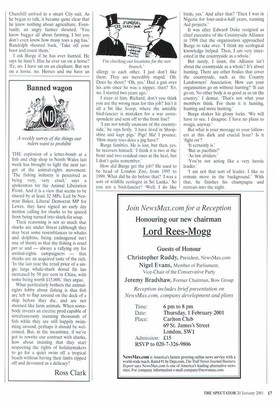Banned wagon
A weekly survey of the things our rulers want to prohibit
THE explosion of a letter-bomb at a fish and chip shop in North Wales last week has brought to light the next target of the animal-rights movement. 'The fishing industry is perceived as being very, very cruel,' says a spokesman for the Animal Liberation Front. And it is a view that seems to be shared by at least 32 MPs. Led by Norman Baker, Liberal Democrat MP for Lewes. they have signed an early day motion calling for sharks to be spared from being turned into shark-fin soup.
Their reasoning is not so much that sharks are under threat (although they may bear some resemblances to whales and dolphins, being endangered isn't one of them) as that the fishing is cruel per se and — always a rallying cry for animal-rights campaigners — that sharks are an acquired taste of the rich. 'In the last year the retail price of a single large whale-shark dorsal fin has increased by 50 per cent in China, with some being worth 15,000; they argue.
What particularly bothers the animalrights lobby about fishing is that fish are left to flap around on the deck of a ship before they die, and are not stunned like farm animals. When somebody invents an electric prod capable of simultaneously stunning thousands of fish while they are still happily swimming around, perhaps it should be welcomed. But, in the meantime, if we've got to rewrite our contract with sharks, how about insisting that they start respecting the rights of holidaymakers to go for a quiet swim off a tropical beach without having their limbs ripped off and devoured as a delicacy? 'I'm checking out locations for the new branch.'
allergy to each other. I just don't like them. They are incredibly stupid.' Oh. Does he shoot? Oh, yes.' Had a gun over his arm since he was a nipper, then? 'Er, no, I started two years ago.'
I stare at him. Richard, don't you think you are the wrong man for this job? Isn't it all a bit like scoop, where the amiable bird-fancier is mistaken for a war correspondent and sent off to the front line?
`I am not totally unaware of the countryside,' he says hotly. 'I have lived in Shropshire and kept pigs.' Pigs! Ha! I pounce. 'How many toes does a pig have?'
Burge fumbles. He is lost, but then, yes, he recovers himself. `I think it is two at the front and two residual ones at the heel, but I don't quite remember.'
How did Burge get the job? He used to be head of London Zoo, from 1995 to 1999. What did he do before that? 'I was a sort of wildlife ecologist in Sri Lanka.' So you are a bird-fancier? `Well, I do like birds, yes.' And after that? `Then I was in Nigeria for four-and-a-half years, running Aid projects.'
It was after Edward Duke resigned as chief executive of the Countryside Alliance in 1998 that the organisation approached Burge to take over. 'I think my ecological knowledge helped. Then, I am very interested in the countryside as a whole.'
But surely, I insist, the Alliance isn't about the countryside as a whole? It's about hunting. There are other bodies that cover the countryside, such as the Country Landowners' Association. How can your organisation go on without hunting? 'It can go on. No other body is as good as us on the country.' I demur. 'That's not what your members think. For them it is hunting, hunting and more hunting.'
Burge shakes his glossy locks. 'We will have to see. I disagree. I have no plans to resign, anyway.'
But what is your message to your followers at this dark and crucial hour? Is it `fight on'?
`It certainly is.'
`But as pacifists?'
`As law abiders.'
`You're not acting like a very heroic leader.'
'I am not that sort of leader. I like to remain more in the background.' With that, he finishes his champagne and retreats into the night.






























































 Previous page
Previous page